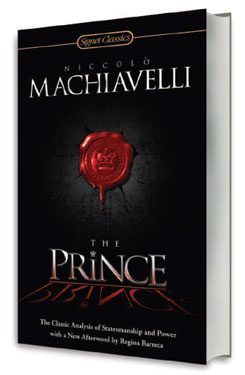 “And here comes in the question whether it is better to be loved rather than feared, or feared rather than loved. It might perhaps be answered that we should wish to be both; but since love and fear can hardly exist together, if we must choose between them, it is far safer to be feared than loved.”
“And here comes in the question whether it is better to be loved rather than feared, or feared rather than loved. It might perhaps be answered that we should wish to be both; but since love and fear can hardly exist together, if we must choose between them, it is far safer to be feared than loved.”
It isn’t often that your name is converted into an adjective, and even rarer that it is used to depict cunning and evil; however, such is the reputation of Florentine diplomat Niccolò Machiavelli, that even 500 years after his greatest contribution to humanity, people use his name largely with disdain.
It is a little ironic, too, that Machiavelli himself wasn’t an evil man; in fact, if anything, he was a rather ordinary bureaucrat who wouldn’t have merited a mention in the annals of history had it not been for his great work of art The Prince. Written shortly after his exile from Florence, after he was released from prison following a short period of being tortured, one can understand, perhaps, why his thinking occasionally ventured into the realms of destruction and why he sought to use fear as a primary tool in human interaction.
The Prince itself is a rather short book filled with 26 chapters, some only a couple of paragraphs long, as Machiavelli races through his message with the speed of a man who knows exactly when and how much to speak. Up there with Sun Tzu’s The Art of War as an eternal classic, The Prince, was originally written in Tuscan and has been translated by many different writers into English. There are free versions of the book available for download, courtesy Project Gutenberg in virtually all digital formats.
A political science masterpiece, The Prince is virtually a how-to-guide for anyone seeking to claim or retain power. Many of the lessons in the book are just as relevant in today’s political setting, despite having been originally written for kingdoms rather than republics. In fact, business leaders are likely to glean plenty of useful learnings from the book, too, as they attempt to remain competitive and relevant in today’s rapidly changing global environment.
For political leaders, too, Machiavelli outlines step-by-step different ways in which one can capture power, and the likelihood of the success of each of these. If one refrains from taking some of his suggestions literally, and attempts to adopt them to a considerably different time and place, there is immense value to be had. Perhaps the best element of Machiavelli’s writing is how he elucidates every one of his points with examples, and while most of these would not be self-explanatory to someone of our time, sitting with Wikipedia by one’s side, they become easy to grasp and make his text all the more useful.
It is hard to pick any one section of his book as a favourite, although chapters V to VIII, which focus on “How to govern principalities that have been newly acquired” are especially insightful, as are Chapters XII and XIII, which examine the kind of soldiers one should keep in one’s army.
Replace the word “soldier” with follower or party worker in today’s environment, and Machiavelli’s knowledge is tremendously useful for any wannabe political leader with aspirations beyond his own constituency.
